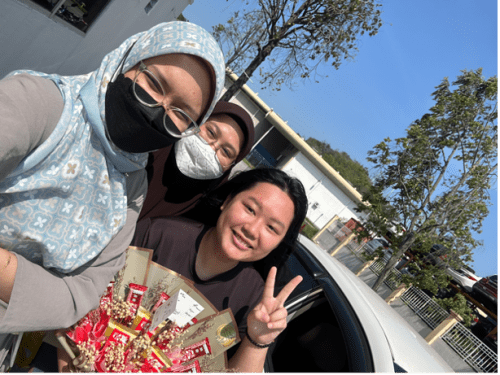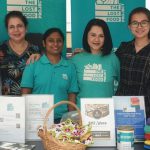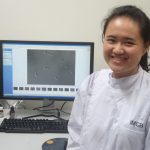A group of 4 students from the PC220 cohort seized the opportunity to embark on a 4-month internship with Kotra Pharma (M) Sdn Bhd, commencing on November 14, 2022, and concluding on March 15, 2023. For these students, joining the IMU Pharmaceutical Chemistry programme in 2020 had introduced them to various learning approaches. However, the global impact of the COVID-19 pandemic led to a significant shift towards online learning for most educational activities. Nonetheless, these students, particularly as they entered their third year of study, continued to have opportunities for practical, hands-on learning in laboratories, field visits, and internships.
The enthusiasm for hands-on learning remained high as Henry Wong Wai Sam, Tay Chia Pao, Teoh Kah Yee, and Lee Yen Mae readily accepted the internship opportunity at Kotra Pharm (M) Sdn Bhd. These students recognised the significance of internships in preparing them for their future professional careers.
They were fortunate to undertake their training at Kotra Pharma (M) Sdn Bhd, a pharmaceutical company located in Malacca, Malaysia. This company is involved in various facets of the pharmaceutical industry, encompassing research, development, manufacturing, and the marketing of pharmaceutical products. They produce both prescription medications and over-the-counter (OTC) drugs for domestic and international markets, catering to customers in more than 40 countries across the globe.
Here, the students relate their experience at the Quality Control Department and Quality Assurance Department.
Quality Assurance Department
Teoh Kah Yee was assigned to the Quality Assurance Department.
During my internship, my primary task as a QA intern was to familiarise myself with the standards and PIC/S guidelines, and regularly update myself on the current company Standard Operating Procedures (SOPs). I also performed data collection to gather significant information in order to identify the reasons behind certain products experiencing fast degradation.
Additionally, I (extreme right in the photo) learned how to perform Out-of-Specification (OOS) Analysis. I was assigned three products that had shown out-of-specification cases for their Active Pharmaceutical Ingredients (APIs) during stability studies. My role involved studying the BMR of the OOS product, examining the manufacturing process for any deviations, and conducting a self-study on the characteristics of the API.

In addition to OOS analysis, I was also tasked with conducting Gap analysis. This helped me develop a better understanding of the PIC/S guidelines, as I had to compare the latest updates with the current SOP practices at Kotra Pharma. Gap analysis was of utmost importance, as non-compliance with certain requirements stated in the guidelines could result in our company being questioned during external audits and potentially being blocked from exporting products to certain countries.
The knowledge I learnt from modules such as Pharmaceutical Analysis and Pharmaceutics during my academic studies proved to be highly applicable to my work scope as a QA intern. Topics such as ISO standards, GMP, GLP, and quality control testing were covered in these modules. This knowledge was directly applicable to my work environment, as Kotra Pharma strictly adheres to regulations and guidelines to ensure customer safety. Additionally, working in the QA Department enhanced my analytical skills, especially in analysing OOS case studies. I also recognised the significance of teamwork and effective communication in easing our workload. Strong proficiency in Microsoft computer skills, particularly Excel, was highly advantageous in performing tasks efficiently.
CHALLENGES
One of the major challenges I encountered during my internship was the task of conducting OOS analysis. It required extensive reading of journal articles to understand the characteristics of APIs that exhibited assay failure. At times, it felt as if I were enrolled in an R&D department, studying formulation compatibility. However, there are numerous external and internal factors that can contribute to assay failure and produce OOS results. These factors can include formulation issues, deviations during the manufacturing process, lab errors, human errors, machine errors, and environmental factors. Consequently, I had to methodically eliminate each potential factor until only the probable root cause remained.
Fortunately, I had the guidance of a senior Production Pharmacist who provided valuable advice. He directed me to examine the characteristics of the dosage form rather than focusing solely on the API. This revelation led me to investigate the Batch Manufacturing Procedure and suggest that the repeated heating during the manufacturing process might have contributed to the API assay failure for that particular batch.
SUMMARY OF LEARNING
Overall, this internship experience helped me develop into a more independent individual, as many of the assigned tasks required me to work on them individually. Working at Kotra Pharma had its advantages, particularly being part of a well-established company with its own manufacturing site. Witnessing the entire production process, from the combination of raw materials to processing, packaging, and the final product that reaches pharmacies and hospitals, was truly valuable.
I would say that the internship was the happiest period during my three-year academic journey, as it provided me with an opportunity to explore my weaknesses and strengths without the pressure of studying for excellent exam results. It also gave me a glimpse into what the working environment will be like once I start my future employment. Over time, my presentation skills have improved, and I now feel more confident delivering content with a proper flow and professionalism. These improvements can be attributed to the presentation assignments I had each semester, and my internship supervisor has recognized and approved my progress in this area.
Research and Development Department
Lee Yen Mae was assigned to the Research & Development (R&D) Department.
As a research assistant at the Research & Development (R&D) Department of Kotra Pharma, I was given the responsibility of mostly conducting research and reformulating work for the Formulation Team. Specifically, I was assigned to a project on reformulation to improve the quality aspect of a tablet. After researching and coming up with a new formula, a trial batch record (TBR) was required to initiate a benchtop trial. The main goal of benchtop trials was speed experimentation; therefore, it was done on a reduced scale and far from industrial reality. After conducting the trial, the testing result was reviewed. If results were satisfactory and trial objectives were met, stability studies would proceed followed by pilot batch execution; otherwise, reformulation was required and the whole process was repeated until results were satisfactory.
Despite being new in the industry, I was able to complete my tasks thanks to the foundational knowledge I gained from the “Pharmaceutics” module, particularly topics like Quality by Design, pharmaceutical dosage forms and their production and troubleshooting, and quality control tests. Being involved in a reformulation of a drug product, I had acquired technical knowledge in drug formulation design and R&D scale-instrument handling.
CHALLENGES
The most challenging task during the internship was to present desktop research to the R&D Manager. Desktop research, the first step in product design and development, was a research method based on existing materials. The information included but not limited to in the presentation was reference product, market research, literature research, and formulation research. I found it my most challenging and nerve-racking presentation due to the hefty amount of unfamiliar content required to be presented. Furthermore, considering that the target audience consisted of experienced scientists in the pharmaceutical industry, I reminded myself not to make any rookie mistakes.
I could still vividly remember the presentation day when I shared critical information about the drug product and persuaded the manager to approve it. One hurdle to overcome was information finding, including researching, skimming, and analysing. I took it as a learning opportunity and did the best I could, then reached out to my supervisor when in doubt and constantly asked questions to improve so that the presentation contents were in place.

All in all, my time at the R&D department opened my eyes to the pharmaceutical sector as I had the opportunity to witness the product development process from the perspective of the generic market. This first working experience of mine in the pharmaceutical industry also fundamentally prepared me to work in the industry setting.
SUMMARY OF LEARNING
In my opinion, R&D is a great place to go to take a grasp on the pharmaceutical industry, especially product development. Now that I have experienced it, I plan to challenge myself in a similar health industry—medical devices. To be fully prepared in a new area, I think it is essential to utilise the skills that we have picked up and enhanced from the previous experience.
For me, I will take advantage of the problem-solving skills that I have developed during the internship to tackle any problems that I may face during work. Most importantly, I think developing a learning mindset is a great lifelong skill that can help us grow and effectively process new information throughout our careers. Being curious and open to new ideas, and constantly learning make up a learning mindset that keeps us learning, expanding, and growing.




 IMU Pharmaceutical Chemistry student,
Lee Yen Mae who was assigned to the Research & Development (R&D) Department.
IMU Pharmaceutical Chemistry student,
Lee Yen Mae who was assigned to the Research & Development (R&D) Department. 



